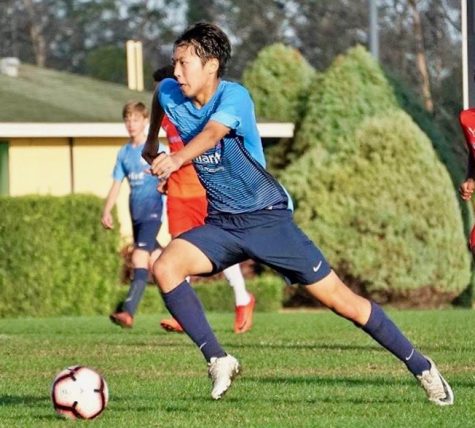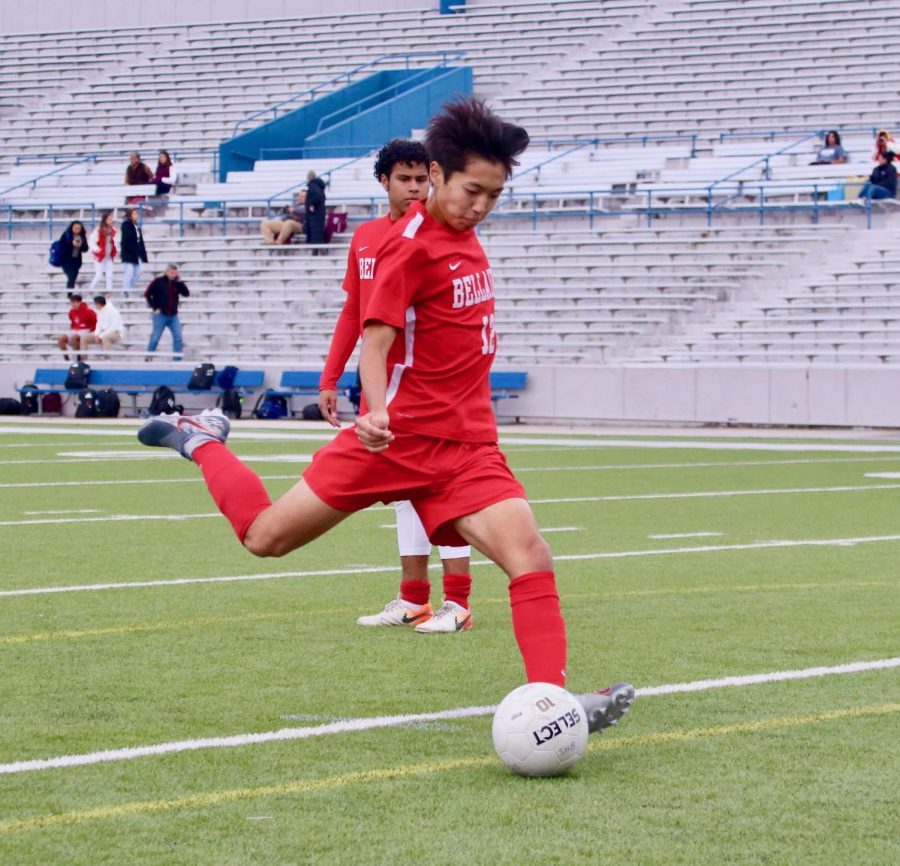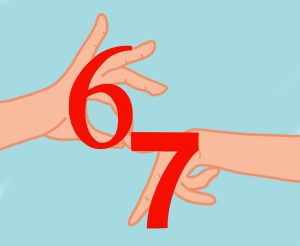The side of soccer no one sees: athlete reflects on demands of club sport
Ricky Kai shoots the soccer in preparation for the game against Lamar at Delmar Stadium during his sophomore season.
Dec 14, 2020
The monotonous sound of the tires on the ground blend with the whistling of the winds as we race through the highway. My dad is mindlessly driving as his favorite podcast plays.
I’m sprawled out in the back seat, thinking about the weekend I’ve just wasted while traveling yet again for a soccer game. The unwinding road to Dallas is one that I’ve taken too often. These weekend car rides usually consist of me lying down in the back as I scroll past pictures of smiling faces on Instagram (which I am obviously not a part of) or furiously try to keep track of the line I’m on in my assigned book for English class while the bumps of the road bobble my head and make me nauseous until I have to stop.
I do this all for the sport I love: soccer.
Perhaps love is an understatement. The hundreds of hours I have spent by myself, thinking about scoring the winning goal for Japan in the World Cup final, juking out defenders with the elegance of Lionel Messi and lifting the trophy after winning the Champions League final is only almost matched by the thousands of hours I have spent chasing those goals.
It is the motions of lifting the ball up, kicking and shooting it that mysteriously inoculate me with the joy I need to continue with the school week. The gloomy, discouraging feelings are immediately wiped away with juggling a ball.
It’s these highs that pushed me to join a club team to become a better player for the sport I love. One, two and three years after I started, my feelings toward soccer transformed to feelings of uneasiness, stress and fear. Staring at the white ceiling in the dark of my room at night, instead of fantasizing about the praise I would receive for my goals, I found myself quietly sobbing about the practice I had to attend the next day.
As a little kid, going into seventh grade, I often compared myself to the people around me. To be bad at soccer was to be a shame to my parents, who were generously pouring their hard earned money into the club fees, my travel expenses and the gear I proudly wore.
To be bad at soccer was to be a shame to my coach. I still remember when he told me how bad I was to not be able to make a five-yard pass during a game.
To be bad at soccer was to be a shame to myself, who I passionately tried to convince that the life of club soccer was enjoyable.
As these thoughts encircled my 13-year-old mind, like sharks waiting to prey on a dying fish, I felt an all-time low. An all-time low where I felt like walking off the field during the middle of the game, an all-time low where I felt like talking back to my coach when he criticized my skill and an all-time low where I felt like confessing my feelings to my parents that I did not enjoy the sport.
At the same time, I told myself that I could not break the social norms which governed the mindset of a 13-year-old boy. I could not cry in front of the people who had sacrificed so much for me to just quit. I could not show weakness to my teammates after another poor performance where I gave the ball to the other team 10 times. And I absolutely had to maintain the ostensibly composed figure that I put on in front of my friends, even when it felt like a virulent disease eating away my soul.

It’s from these emotions from which I swore to myself that I would never see the shaking of the head from my coach to signal disappointment. It’s from these emotions from which I swore to myself that I would never play a game in which my teammates’ parents would scream at me to make a single pass to their son. And it’s from these emotions from which I swore to myself that I would continue to play soccer, even if it meant facing the pain chest then on. From then, every practice would leave me dripping in sweat, gasping for air and drinking bottles of water until my demanding thirst was finally quenched.
For a year or so, this got me where I wanted to be. I passionately won games which could not have been possible if it were not for my burning desire. I lost games with the unity of a true soccer team. I developed into the man I had dreamed to be: strong and unfazed by adversity. But, the temporary triumph I felt during this time was quickly extinguished by the shining talents which undeniably beat the hardworking.
Anyone in sports knows that talent is three fourths of the full pie. At a point, specifically when professional contracts are being handed out to kids my age and you face kids from professional club academies, hard work is thrown out the window. In fact, hard work is an essential to everyone, and that’s exactly why it does not matter. Everyone “works hard” and goes through the pain of rubbery legs, heaving breaths and a mental brick wall which stops you from going any further: it’s natural talent that acts as the springboard that allows players to multiply their development from this work.
As the high school rushes by, I feel incredibly pressured to make up my mind. To continue soccer is a deep dead end. There is a one-millionth of a chance that I live out my childhood dreams: to score in front of the nation of Japan and hold my shirt out in front of the sea of blue jerseys in the stands and point to my number in a proud, honorable fashion. At the same time, if I quit soccer, it could be a shallow end that may lead to a boring life, a life in which I cannot gamble my luck for my future (a tempting choice).
And despite the cracks in my heart from this sport, it warms my heart to step out in my cleats and to play on an even playing field, where the better man ultimately wins the game. Kicking the ball takes me back to my childhood evenings. I am not thinking about solving physics problems, analyzing quotes for English class or worrying about the next calculus test. Instead, I am practicing my goal celebrations in the mirror. I am making up commentary for my own imaginary goals and daydreaming about the the future.
Yes, I still love the rushing feeling of adrenaline when I make a great pass, score a goal or put in a tackle to win a ball: the ball.
The cycle repeats itself. I love this game.








Jamey Duong • Dec 16, 2020 at 1:45 pm
What an amazing ending. Great story. This has motivated me a lot.
Vinh Duong • Dec 16, 2020 at 1:44 pm
Well written and developed, this article let me know a little bit more about my friend. Props Ricky and may your success continue on for a lifetime.
Nabila Wilson • Dec 16, 2020 at 12:24 pm
As someone who is not at all an athlete, this was so raw and interesting! Love it, Ricky!